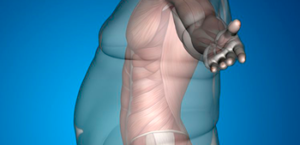
Obesity is a complex disease that is not caused by one single issue and gastric bypass surgery has emerged as an effective solution for weight loss, offering hope to individuals struggling with severe obesity. While the procedure is commonly seen as a permanent alteration, recent advancements have made it possible to reverse gastric bypass surgery.
Many things factor into the equation that leads an individual to gain weight to the point of threatening their health. Genes certainly play a role, but statistics from the last few decades indicate that the environment plays an even more important one. The American Psychological Association states that “the causes of obesity are rarely limited to genetic factors, overeating or leading a sedentary lifestyle. What we do and not do often is the result of how we think and how we feel”[1].
What is gastric bypass surgery?
Gastric bypass surgery consists of a twofold method for the reduction of weight. The surgeon reduces the patient’s stomach and connects it to a distal part of the intestine. A smaller stomach is able to hold less food and that which is consumed does not pass through the first part of the small intestine, resulting in reduced calorie absorption. In other words, this surgical procedure creates two different mechanisms that enable weight loss: the reduction of the stomach’s size plus a shortcut passage for the digestive system through the small intestine. In this sense, the gastric bypass is a restrictive and malabsorptive procedure, since it restricts food intake and also modifies the absorptive capacity of the digestive system.
There are several variations to the gastric bypass and while their ultimate goal is the same, the techniques surgeons use to carry them out is what makes them different. Here are some of the types of gastric bypass:
- Roux-en-Y (proximal)
- Roux-en-Y (distal)
- Mini-gastric bypass
- Endoscopic duodenal-jejunal bypass
Before and After Gastric Bypass Surgery transformations
Dr. Liza María Pompa has practiced thousands of gastric bypass surgeries at LIMARP. Patients have traveled from all over the world, mainly the United States, Canada, Europe and inner states of Mexico to receive bariatric surgery and obesity treatment at LIMARP. Some of these patients are cases of success, their lives have changed and you can find more information and before and after gastric surgery photos in our success stories section.
Is the Gastric Bypass Reversible?
Gastric bypass surgery has traditionally been viewed as an irreversible procedure. However, advancements in medical science and surgical techniques have made it possible to reverse the effects of gastric bypass surgery. This reversal procedure, known as gastric bypass reversal or reversal of Roux-en-Y gastric bypass (RYGB)[2], aims to restore the anatomy and functionality of the digestive systems. Although there exists limited information about the reasons to reverse a gastric bypass, here are a few cases that might end in having a gastric bypass reversible.
There are various reasons why an individual may consider reversing their gastric bypass surgery. These include:
- Complications: Some individuals may experience complications following gastric bypass surgery, such as malnutrition, ulcers, chronic dumping syndrome, or gastrointestinal issues. “In our experience, short gut syndrome, renal failure, marginal ulceration, and malnutrition were the most common indications for reversal, differing from previously published data. Indications can depend on patient and surgeon preferences, but primarily on surgeon experience and type of complications”. [3] Thus, having a gastric bypass reversible may be considered to alleviate these complications.
- Weight regain: While gastric bypass surgery is highly effective in achieving weight loss, some individuals may experience weight regain over time. Reversal allows for a return to the original anatomy, potentially leading to weight regain[4].
- lifestyle changes: Personal circumstances or health conditions may change over time, and individuals may wish to reverse the surgery to accommodate these changes. For example, pregnancy or the need for certain medications may be factors that influence the decision.
- Individual circumstances: Each person’s situation is unique, and the decision to have a reversible gastric bypass surgery should be based on an individual’s specific needs, health conditions, and long-term goals.
- Reversibility limitations: Gastric bypass reversal is not always possible or may carry certain risks. The extent to which the procedure can be reversed depends on factors such as the patient’s initial anatomy and the techniques used during the original surgery.
- Weight management: Reversal may lead to weight regain, so it is important to have a plan for managing weight after the procedure. Working closely with healthcare professionals, including nutritionists and dieticians, can help individuals maintain a healthy weight and lifestyle post-reversal[5]
In conclusion a gastric bypass reversible offers hope to individuals who have undergone gastric bypass surgery but may require a revision due to complications, lifestyle changes, or weight regain. While gastric bypass surgery is generally considered a permanent procedure, advances in medical science have made reversibility a possibility in certain cases. However, the decision to reverse gastric bypass surgery should be made after careful consideration and consultation with healthcare professionals to ensure the best possible outcome for each individual’s unique circumstances.
Contact Us to Learn More
If you want to learn more about gastric bypass reversible, schedule an appointment with one of our doctors. We can help determine the right treatment for you. Contact us online anytime or give us a call at (619) 373-0229.
References
- [1] “Mind/body health: Obesity”. https://www.apa.org/topics/obesity/mind-body-health (Accessed June 30, 2023).
- [2] Pernar LI, Kim JJ, Shikora SA. Gastric bypass reversal: a 7-year experience. Surg Obes Relat Dis. 2016 Sep-Oct;12(8):1492-1498. doi: 10.1016/j.soard.2016.03.032. Epub 2016 Apr 2. PMID: 27387697.
- [3] Chousleb E, Patel S, Szomstein S, Rosenthal R. Reasons and operative outcomes after reversal of gastric bypass and jejunoileal bypass. Obes Surg. 2012 Oct;22(10):1611-6. doi: 10.1007/s11695-012-0715-z. PMID: 22810420.
- [4, 5] El Ansari W, Elhag W. Weight Regain and Insufficient Weight Loss After Bariatric Surgery: Definitions, Prevalence, Mechanisms, Predictors, Prevention and Management Strategies, and Knowledge Gaps-a Scoping Review. Obes Surg. 2021 Apr;31(4):1755-1766. doi: 10.1007/s11695-020-05160-5. Epub 2021 Feb 8. PMID: 33555451; PMCID: PMC8012333.


